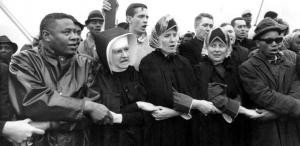
For Sister Madeline Dorsey, it was a day in which she and another Maryknoll Sister were placed on the front lines of that march, representing the Black doctors who worked with them at Queen of the World Hospital, the nation’s first interracial hospital, located in Kansas City, MO.
Sister Maddie, now 96, still vividly remembers that regular evening meeting with doctors at that hospital, when the doctors urged them to go to Selma and represent them. She explained that Maryknoll already had plans for two of their Sisters – one from their work among Chinese people in Chicago and another from their ministry among the Japanese in San Francisco – to attend and represent them. “But Sister,” one of the doctors, a “big, burly” fellow, responded, “we are scared! We want you there to represent us!” Sister Maddie said she’d talk to Mother Superior Coleman, assuring the doctors, “I’m sure she will agree to it.” She did.
That Friday morning, March 7, 1965, Sisters Maddie and Christine Donnelly, along with two Sisters from another congregation, a Presbyterian minister and a few others flew to Selma, arriving there in the afternoon for what was expected to be a weekend event.
She recalls what happened next as if it were yesterday:
“As soon as we arrived, the Jesuit priest who had come from one of their colleges in the Northeast grabbed us three Sisters – the Charity Sister from Kansas City, KS, and Sister John Christine Donnelly and myself, Maryknollers – and put us in the front line. Well I think Father thought that having us there would be further evidence that the Church was with them.”
From their front line position, the Sisters and black men with them were face to face with law enforcement officials. “So we had to face the troopers with their ‘whack-em’ sticks – terrible looking things, almost bigger than a baseball bat – so that if you made any move at all, you got whammed. They no doubt had guns on them, but what you were facing were these blue eyes filled with hate for the supporters of the Blacks. I have never before or since seen hate like that in eyes – ever! But you could read it, and it just made me mad to see these blue eyes!
Despite the frightening circumstances, Sister Maddie said they didn’t feel afraid. “We all sang. We’re singing, “We shall overcome!” All that. And some of the really beautiful “Negro spirituals. It was very friendly. We had our arms crossed and linked right across, row after row, all like that, and singing away. And the Negro spirituals were all so beautiful. They’re easy to catch on to. But the “We Shall Overcome” was sung over and over.”
Today, considering her participation that day as just a natural outgrowth of the work they’d been doing in Kansas City for the past 10 years, bringing integration to the schools and hospitals, she is also aware that the job of bringing full equality and social justice for all people to this country is far from over. Sighing, she considers the present-day headlines of police vs. people of color, and commented, “It’s disheartening what’s happening still.”
